Nursing Care for Older People
VerifiedAdded on 2022/08/22
|10
|2464
|42
AI Summary
Contribute Materials
Your contribution can guide someone’s learning journey. Share your
documents today.
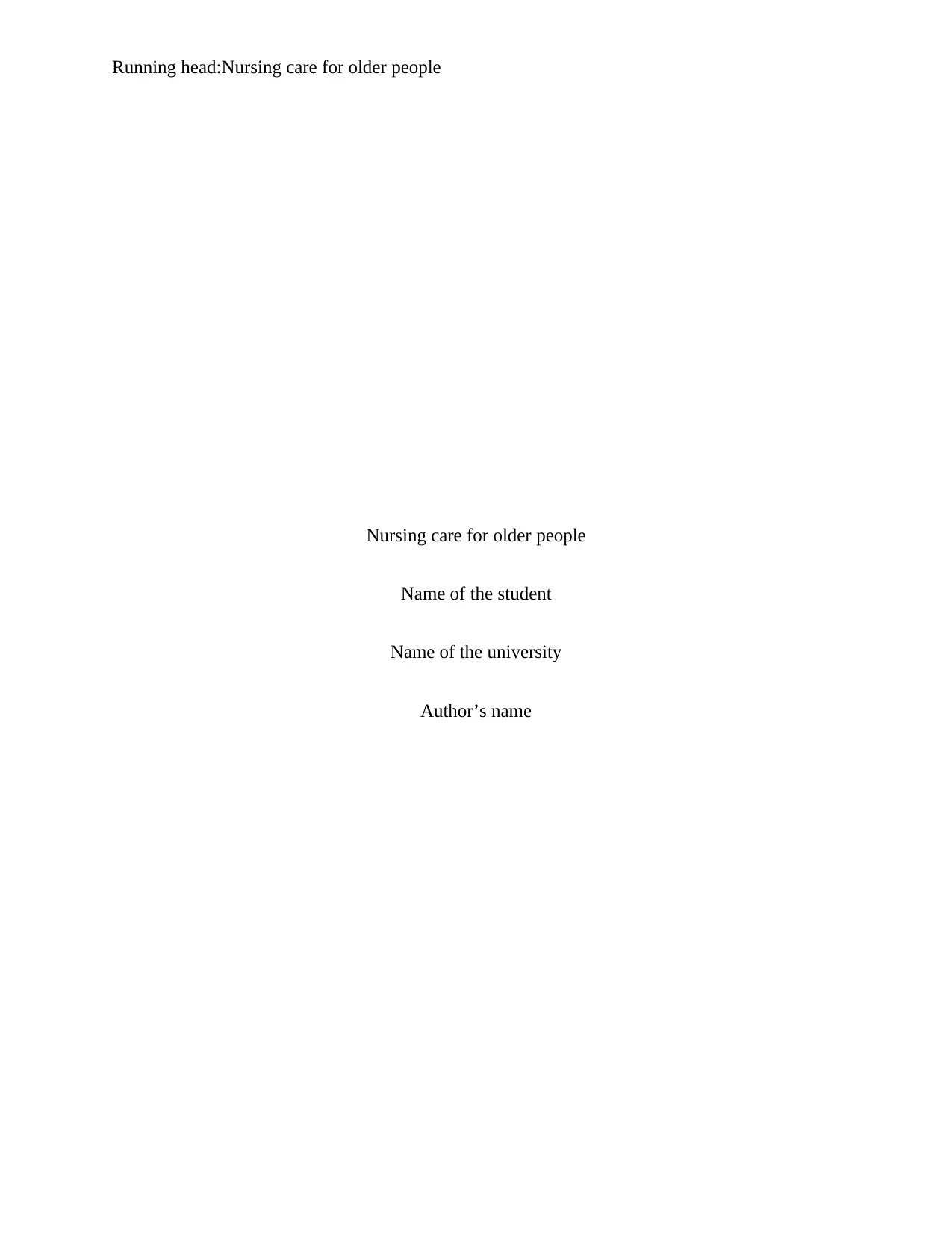
Running head:Nursing care for older people
Nursing care for older people
Name of the student
Name of the university
Author’s name
Nursing care for older people
Name of the student
Name of the university
Author’s name
Secure Best Marks with AI Grader
Need help grading? Try our AI Grader for instant feedback on your assignments.
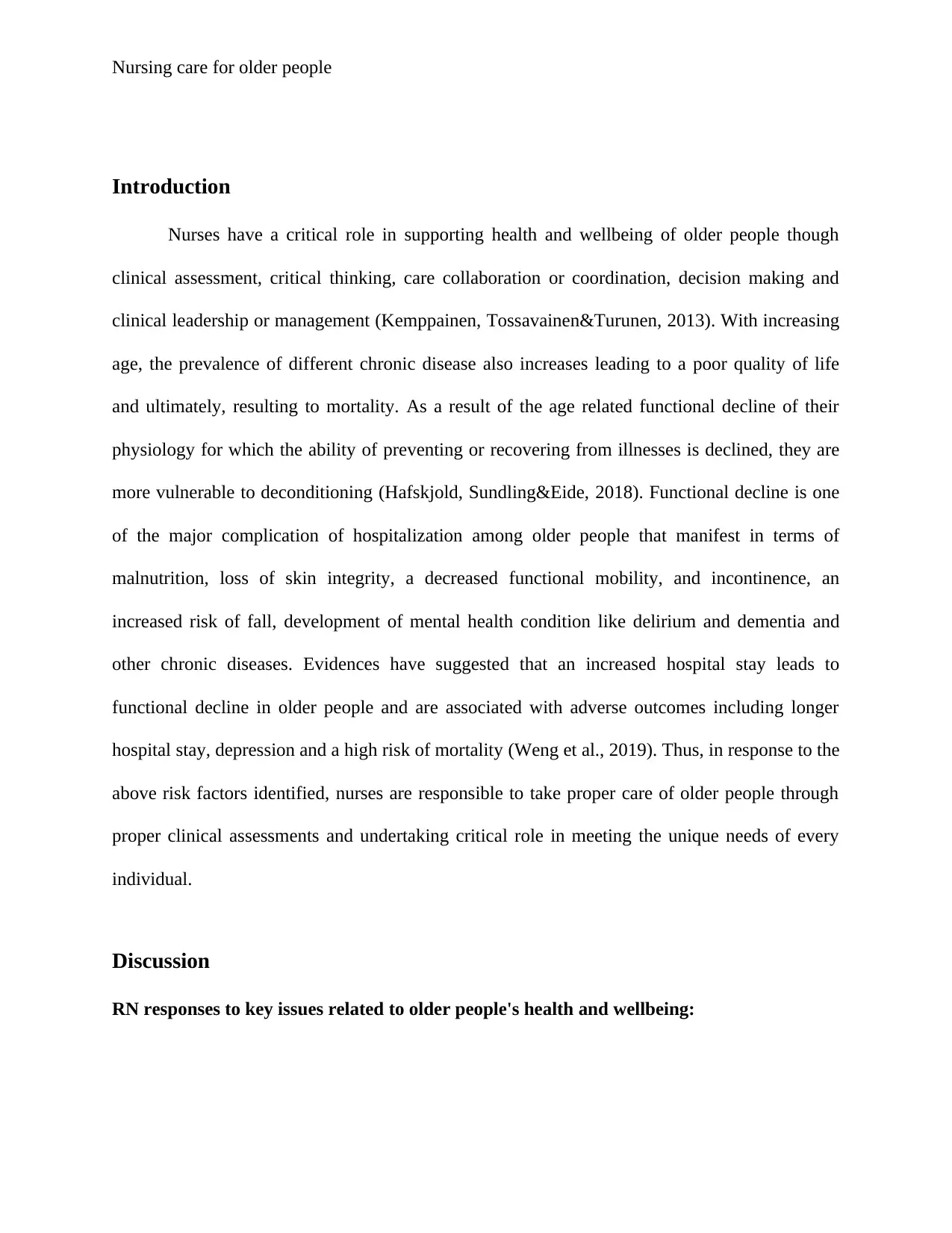
Nursing care for older people
Introduction
Nurses have a critical role in supporting health and wellbeing of older people though
clinical assessment, critical thinking, care collaboration or coordination, decision making and
clinical leadership or management (Kemppainen, Tossavainen&Turunen, 2013). With increasing
age, the prevalence of different chronic disease also increases leading to a poor quality of life
and ultimately, resulting to mortality. As a result of the age related functional decline of their
physiology for which the ability of preventing or recovering from illnesses is declined, they are
more vulnerable to deconditioning (Hafskjold, Sundling&Eide, 2018). Functional decline is one
of the major complication of hospitalization among older people that manifest in terms of
malnutrition, loss of skin integrity, a decreased functional mobility, and incontinence, an
increased risk of fall, development of mental health condition like delirium and dementia and
other chronic diseases. Evidences have suggested that an increased hospital stay leads to
functional decline in older people and are associated with adverse outcomes including longer
hospital stay, depression and a high risk of mortality (Weng et al., 2019). Thus, in response to the
above risk factors identified, nurses are responsible to take proper care of older people through
proper clinical assessments and undertaking critical role in meeting the unique needs of every
individual.
Discussion
RN responses to key issues related to older people's health and wellbeing:
Introduction
Nurses have a critical role in supporting health and wellbeing of older people though
clinical assessment, critical thinking, care collaboration or coordination, decision making and
clinical leadership or management (Kemppainen, Tossavainen&Turunen, 2013). With increasing
age, the prevalence of different chronic disease also increases leading to a poor quality of life
and ultimately, resulting to mortality. As a result of the age related functional decline of their
physiology for which the ability of preventing or recovering from illnesses is declined, they are
more vulnerable to deconditioning (Hafskjold, Sundling&Eide, 2018). Functional decline is one
of the major complication of hospitalization among older people that manifest in terms of
malnutrition, loss of skin integrity, a decreased functional mobility, and incontinence, an
increased risk of fall, development of mental health condition like delirium and dementia and
other chronic diseases. Evidences have suggested that an increased hospital stay leads to
functional decline in older people and are associated with adverse outcomes including longer
hospital stay, depression and a high risk of mortality (Weng et al., 2019). Thus, in response to the
above risk factors identified, nurses are responsible to take proper care of older people through
proper clinical assessments and undertaking critical role in meeting the unique needs of every
individual.
Discussion
RN responses to key issues related to older people's health and wellbeing:
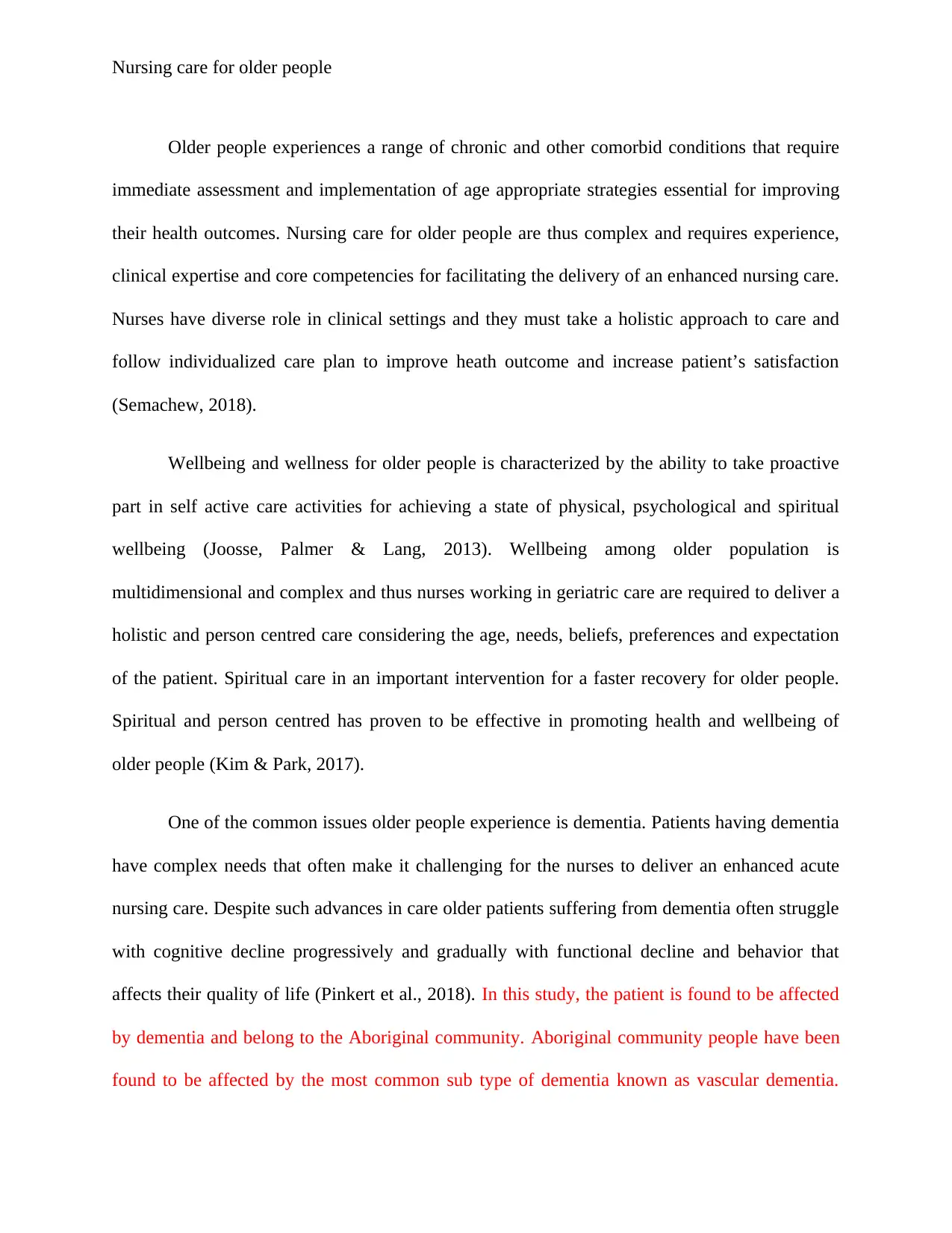
Nursing care for older people
Older people experiences a range of chronic and other comorbid conditions that require
immediate assessment and implementation of age appropriate strategies essential for improving
their health outcomes. Nursing care for older people are thus complex and requires experience,
clinical expertise and core competencies for facilitating the delivery of an enhanced nursing care.
Nurses have diverse role in clinical settings and they must take a holistic approach to care and
follow individualized care plan to improve heath outcome and increase patient’s satisfaction
(Semachew, 2018).
Wellbeing and wellness for older people is characterized by the ability to take proactive
part in self active care activities for achieving a state of physical, psychological and spiritual
wellbeing (Joosse, Palmer & Lang, 2013). Wellbeing among older population is
multidimensional and complex and thus nurses working in geriatric care are required to deliver a
holistic and person centred care considering the age, needs, beliefs, preferences and expectation
of the patient. Spiritual care in an important intervention for a faster recovery for older people.
Spiritual and person centred has proven to be effective in promoting health and wellbeing of
older people (Kim & Park, 2017).
One of the common issues older people experience is dementia. Patients having dementia
have complex needs that often make it challenging for the nurses to deliver an enhanced acute
nursing care. Despite such advances in care older patients suffering from dementia often struggle
with cognitive decline progressively and gradually with functional decline and behavior that
affects their quality of life (Pinkert et al., 2018). In this study, the patient is found to be affected
by dementia and belong to the Aboriginal community. Aboriginal community people have been
found to be affected by the most common sub type of dementia known as vascular dementia.
Older people experiences a range of chronic and other comorbid conditions that require
immediate assessment and implementation of age appropriate strategies essential for improving
their health outcomes. Nursing care for older people are thus complex and requires experience,
clinical expertise and core competencies for facilitating the delivery of an enhanced nursing care.
Nurses have diverse role in clinical settings and they must take a holistic approach to care and
follow individualized care plan to improve heath outcome and increase patient’s satisfaction
(Semachew, 2018).
Wellbeing and wellness for older people is characterized by the ability to take proactive
part in self active care activities for achieving a state of physical, psychological and spiritual
wellbeing (Joosse, Palmer & Lang, 2013). Wellbeing among older population is
multidimensional and complex and thus nurses working in geriatric care are required to deliver a
holistic and person centred care considering the age, needs, beliefs, preferences and expectation
of the patient. Spiritual care in an important intervention for a faster recovery for older people.
Spiritual and person centred has proven to be effective in promoting health and wellbeing of
older people (Kim & Park, 2017).
One of the common issues older people experience is dementia. Patients having dementia
have complex needs that often make it challenging for the nurses to deliver an enhanced acute
nursing care. Despite such advances in care older patients suffering from dementia often struggle
with cognitive decline progressively and gradually with functional decline and behavior that
affects their quality of life (Pinkert et al., 2018). In this study, the patient is found to be affected
by dementia and belong to the Aboriginal community. Aboriginal community people have been
found to be affected by the most common sub type of dementia known as vascular dementia.
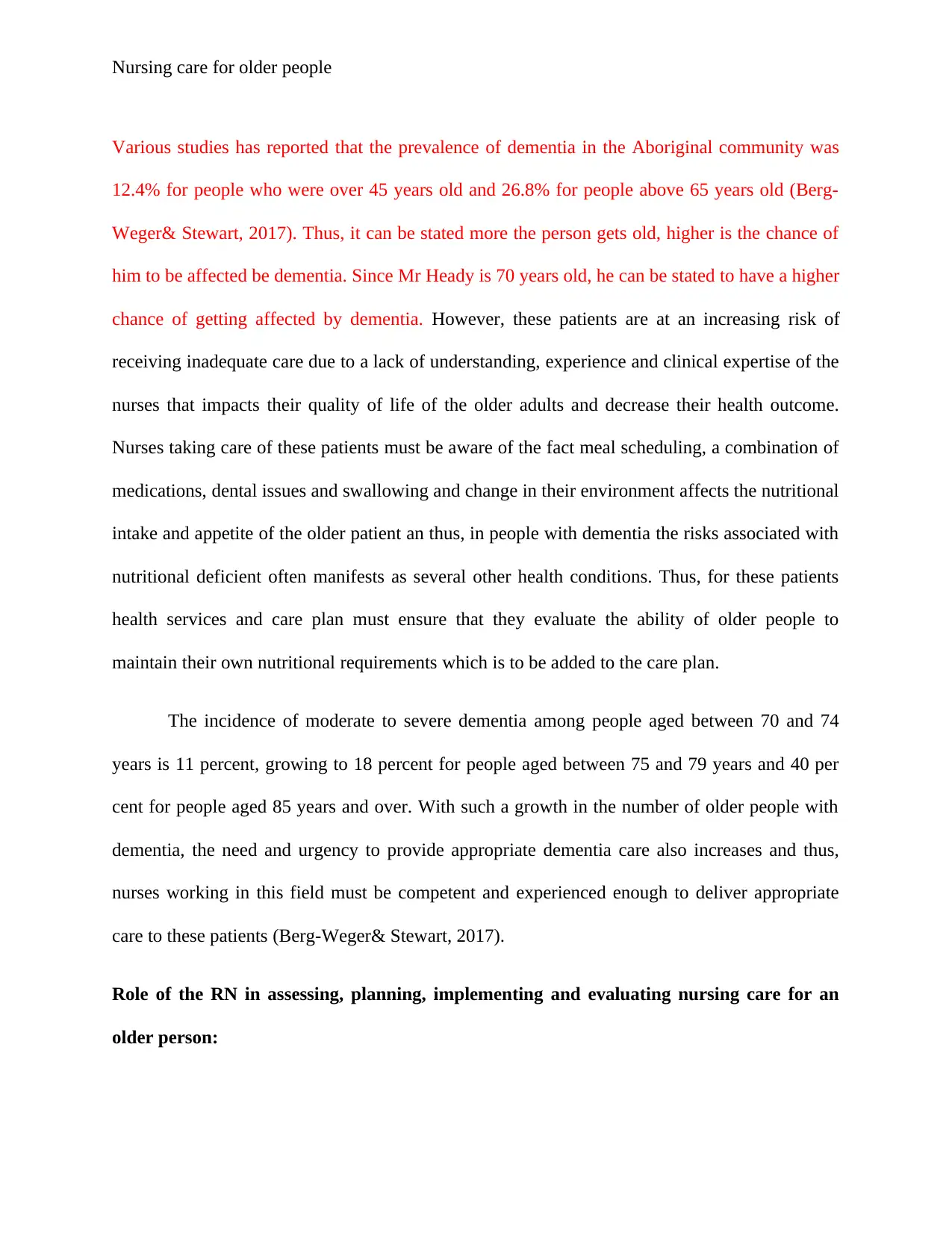
Nursing care for older people
Various studies has reported that the prevalence of dementia in the Aboriginal community was
12.4% for people who were over 45 years old and 26.8% for people above 65 years old (Berg-
Weger& Stewart, 2017). Thus, it can be stated more the person gets old, higher is the chance of
him to be affected be dementia. Since Mr Heady is 70 years old, he can be stated to have a higher
chance of getting affected by dementia. However, these patients are at an increasing risk of
receiving inadequate care due to a lack of understanding, experience and clinical expertise of the
nurses that impacts their quality of life of the older adults and decrease their health outcome.
Nurses taking care of these patients must be aware of the fact meal scheduling, a combination of
medications, dental issues and swallowing and change in their environment affects the nutritional
intake and appetite of the older patient an thus, in people with dementia the risks associated with
nutritional deficient often manifests as several other health conditions. Thus, for these patients
health services and care plan must ensure that they evaluate the ability of older people to
maintain their own nutritional requirements which is to be added to the care plan.
The incidence of moderate to severe dementia among people aged between 70 and 74
years is 11 percent, growing to 18 percent for people aged between 75 and 79 years and 40 per
cent for people aged 85 years and over. With such a growth in the number of older people with
dementia, the need and urgency to provide appropriate dementia care also increases and thus,
nurses working in this field must be competent and experienced enough to deliver appropriate
care to these patients (Berg-Weger& Stewart, 2017).
Role of the RN in assessing, planning, implementing and evaluating nursing care for an
older person:
Various studies has reported that the prevalence of dementia in the Aboriginal community was
12.4% for people who were over 45 years old and 26.8% for people above 65 years old (Berg-
Weger& Stewart, 2017). Thus, it can be stated more the person gets old, higher is the chance of
him to be affected be dementia. Since Mr Heady is 70 years old, he can be stated to have a higher
chance of getting affected by dementia. However, these patients are at an increasing risk of
receiving inadequate care due to a lack of understanding, experience and clinical expertise of the
nurses that impacts their quality of life of the older adults and decrease their health outcome.
Nurses taking care of these patients must be aware of the fact meal scheduling, a combination of
medications, dental issues and swallowing and change in their environment affects the nutritional
intake and appetite of the older patient an thus, in people with dementia the risks associated with
nutritional deficient often manifests as several other health conditions. Thus, for these patients
health services and care plan must ensure that they evaluate the ability of older people to
maintain their own nutritional requirements which is to be added to the care plan.
The incidence of moderate to severe dementia among people aged between 70 and 74
years is 11 percent, growing to 18 percent for people aged between 75 and 79 years and 40 per
cent for people aged 85 years and over. With such a growth in the number of older people with
dementia, the need and urgency to provide appropriate dementia care also increases and thus,
nurses working in this field must be competent and experienced enough to deliver appropriate
care to these patients (Berg-Weger& Stewart, 2017).
Role of the RN in assessing, planning, implementing and evaluating nursing care for an
older person:
Secure Best Marks with AI Grader
Need help grading? Try our AI Grader for instant feedback on your assignments.
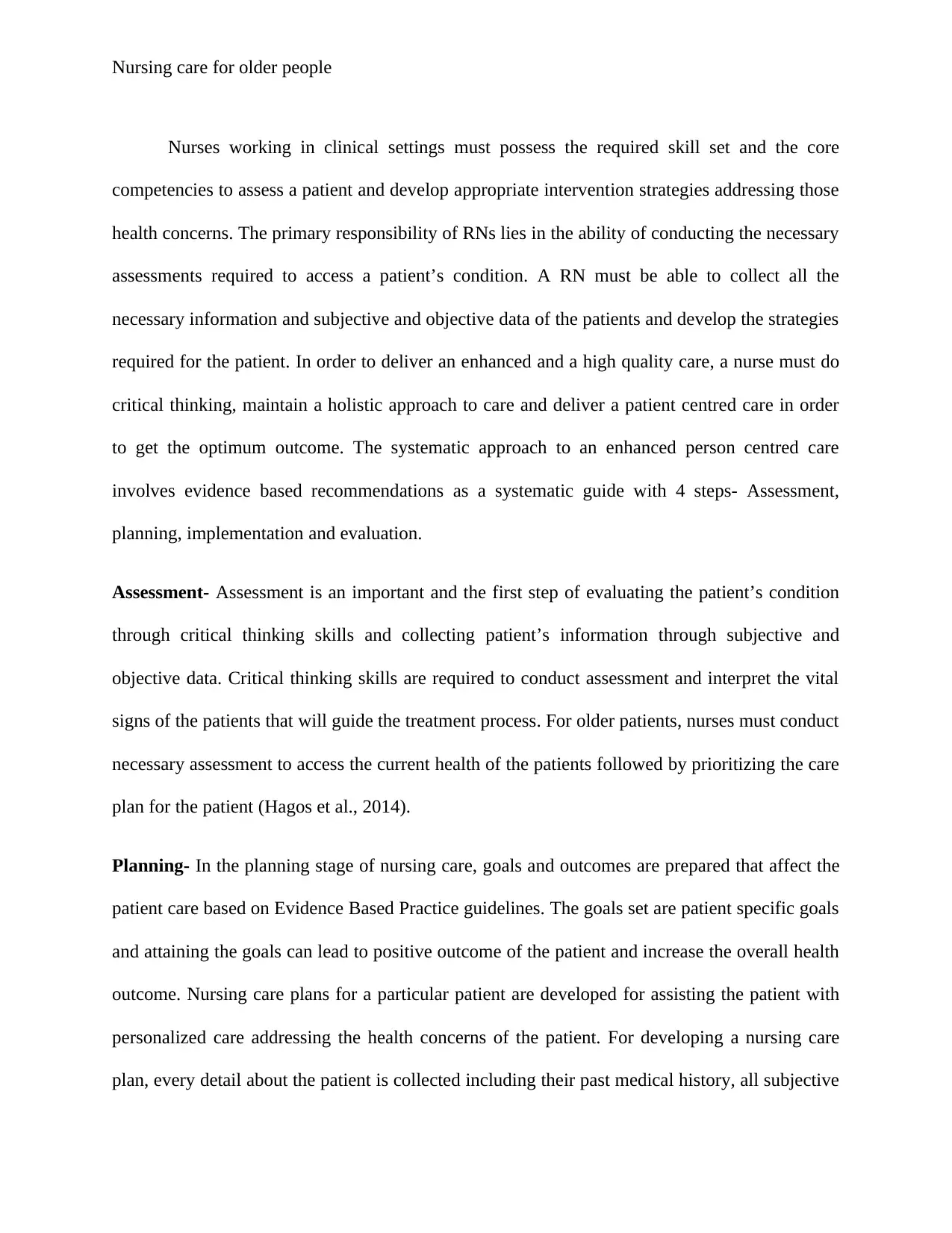
Nursing care for older people
Nurses working in clinical settings must possess the required skill set and the core
competencies to assess a patient and develop appropriate intervention strategies addressing those
health concerns. The primary responsibility of RNs lies in the ability of conducting the necessary
assessments required to access a patient’s condition. A RN must be able to collect all the
necessary information and subjective and objective data of the patients and develop the strategies
required for the patient. In order to deliver an enhanced and a high quality care, a nurse must do
critical thinking, maintain a holistic approach to care and deliver a patient centred care in order
to get the optimum outcome. The systematic approach to an enhanced person centred care
involves evidence based recommendations as a systematic guide with 4 steps- Assessment,
planning, implementation and evaluation.
Assessment- Assessment is an important and the first step of evaluating the patient’s condition
through critical thinking skills and collecting patient’s information through subjective and
objective data. Critical thinking skills are required to conduct assessment and interpret the vital
signs of the patients that will guide the treatment process. For older patients, nurses must conduct
necessary assessment to access the current health of the patients followed by prioritizing the care
plan for the patient (Hagos et al., 2014).
Planning- In the planning stage of nursing care, goals and outcomes are prepared that affect the
patient care based on Evidence Based Practice guidelines. The goals set are patient specific goals
and attaining the goals can lead to positive outcome of the patient and increase the overall health
outcome. Nursing care plans for a particular patient are developed for assisting the patient with
personalized care addressing the health concerns of the patient. For developing a nursing care
plan, every detail about the patient is collected including their past medical history, all subjective
Nurses working in clinical settings must possess the required skill set and the core
competencies to assess a patient and develop appropriate intervention strategies addressing those
health concerns. The primary responsibility of RNs lies in the ability of conducting the necessary
assessments required to access a patient’s condition. A RN must be able to collect all the
necessary information and subjective and objective data of the patients and develop the strategies
required for the patient. In order to deliver an enhanced and a high quality care, a nurse must do
critical thinking, maintain a holistic approach to care and deliver a patient centred care in order
to get the optimum outcome. The systematic approach to an enhanced person centred care
involves evidence based recommendations as a systematic guide with 4 steps- Assessment,
planning, implementation and evaluation.
Assessment- Assessment is an important and the first step of evaluating the patient’s condition
through critical thinking skills and collecting patient’s information through subjective and
objective data. Critical thinking skills are required to conduct assessment and interpret the vital
signs of the patients that will guide the treatment process. For older patients, nurses must conduct
necessary assessment to access the current health of the patients followed by prioritizing the care
plan for the patient (Hagos et al., 2014).
Planning- In the planning stage of nursing care, goals and outcomes are prepared that affect the
patient care based on Evidence Based Practice guidelines. The goals set are patient specific goals
and attaining the goals can lead to positive outcome of the patient and increase the overall health
outcome. Nursing care plans for a particular patient are developed for assisting the patient with
personalized care addressing the health concerns of the patient. For developing a nursing care
plan, every detail about the patient is collected including their past medical history, all subjective
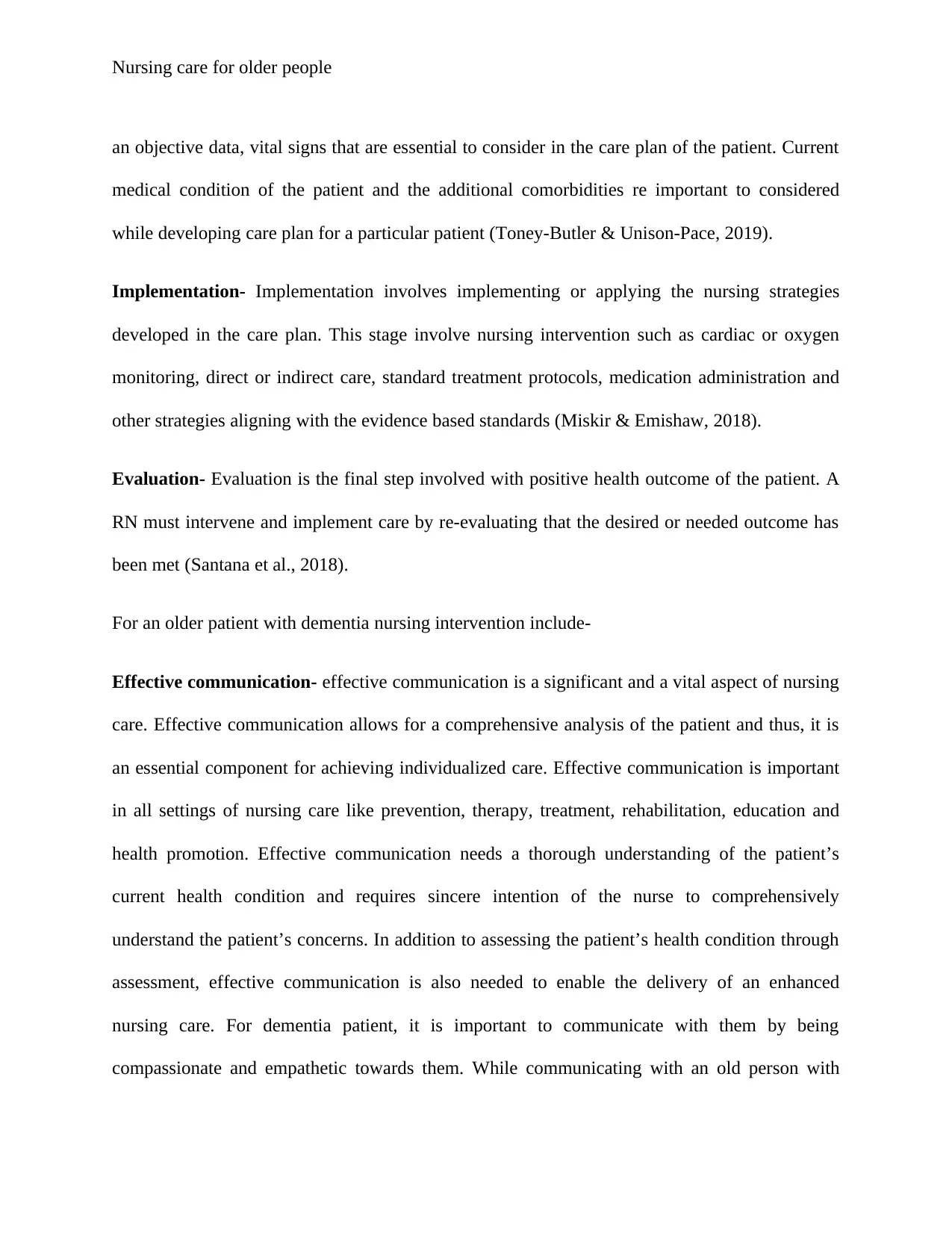
Nursing care for older people
an objective data, vital signs that are essential to consider in the care plan of the patient. Current
medical condition of the patient and the additional comorbidities re important to considered
while developing care plan for a particular patient (Toney-Butler & Unison-Pace, 2019).
Implementation- Implementation involves implementing or applying the nursing strategies
developed in the care plan. This stage involve nursing intervention such as cardiac or oxygen
monitoring, direct or indirect care, standard treatment protocols, medication administration and
other strategies aligning with the evidence based standards (Miskir & Emishaw, 2018).
Evaluation- Evaluation is the final step involved with positive health outcome of the patient. A
RN must intervene and implement care by re-evaluating that the desired or needed outcome has
been met (Santana et al., 2018).
For an older patient with dementia nursing intervention include-
Effective communication- effective communication is a significant and a vital aspect of nursing
care. Effective communication allows for a comprehensive analysis of the patient and thus, it is
an essential component for achieving individualized care. Effective communication is important
in all settings of nursing care like prevention, therapy, treatment, rehabilitation, education and
health promotion. Effective communication needs a thorough understanding of the patient’s
current health condition and requires sincere intention of the nurse to comprehensively
understand the patient’s concerns. In addition to assessing the patient’s health condition through
assessment, effective communication is also needed to enable the delivery of an enhanced
nursing care. For dementia patient, it is important to communicate with them by being
compassionate and empathetic towards them. While communicating with an old person with
an objective data, vital signs that are essential to consider in the care plan of the patient. Current
medical condition of the patient and the additional comorbidities re important to considered
while developing care plan for a particular patient (Toney-Butler & Unison-Pace, 2019).
Implementation- Implementation involves implementing or applying the nursing strategies
developed in the care plan. This stage involve nursing intervention such as cardiac or oxygen
monitoring, direct or indirect care, standard treatment protocols, medication administration and
other strategies aligning with the evidence based standards (Miskir & Emishaw, 2018).
Evaluation- Evaluation is the final step involved with positive health outcome of the patient. A
RN must intervene and implement care by re-evaluating that the desired or needed outcome has
been met (Santana et al., 2018).
For an older patient with dementia nursing intervention include-
Effective communication- effective communication is a significant and a vital aspect of nursing
care. Effective communication allows for a comprehensive analysis of the patient and thus, it is
an essential component for achieving individualized care. Effective communication is important
in all settings of nursing care like prevention, therapy, treatment, rehabilitation, education and
health promotion. Effective communication needs a thorough understanding of the patient’s
current health condition and requires sincere intention of the nurse to comprehensively
understand the patient’s concerns. In addition to assessing the patient’s health condition through
assessment, effective communication is also needed to enable the delivery of an enhanced
nursing care. For dementia patient, it is important to communicate with them by being
compassionate and empathetic towards them. While communicating with an old person with
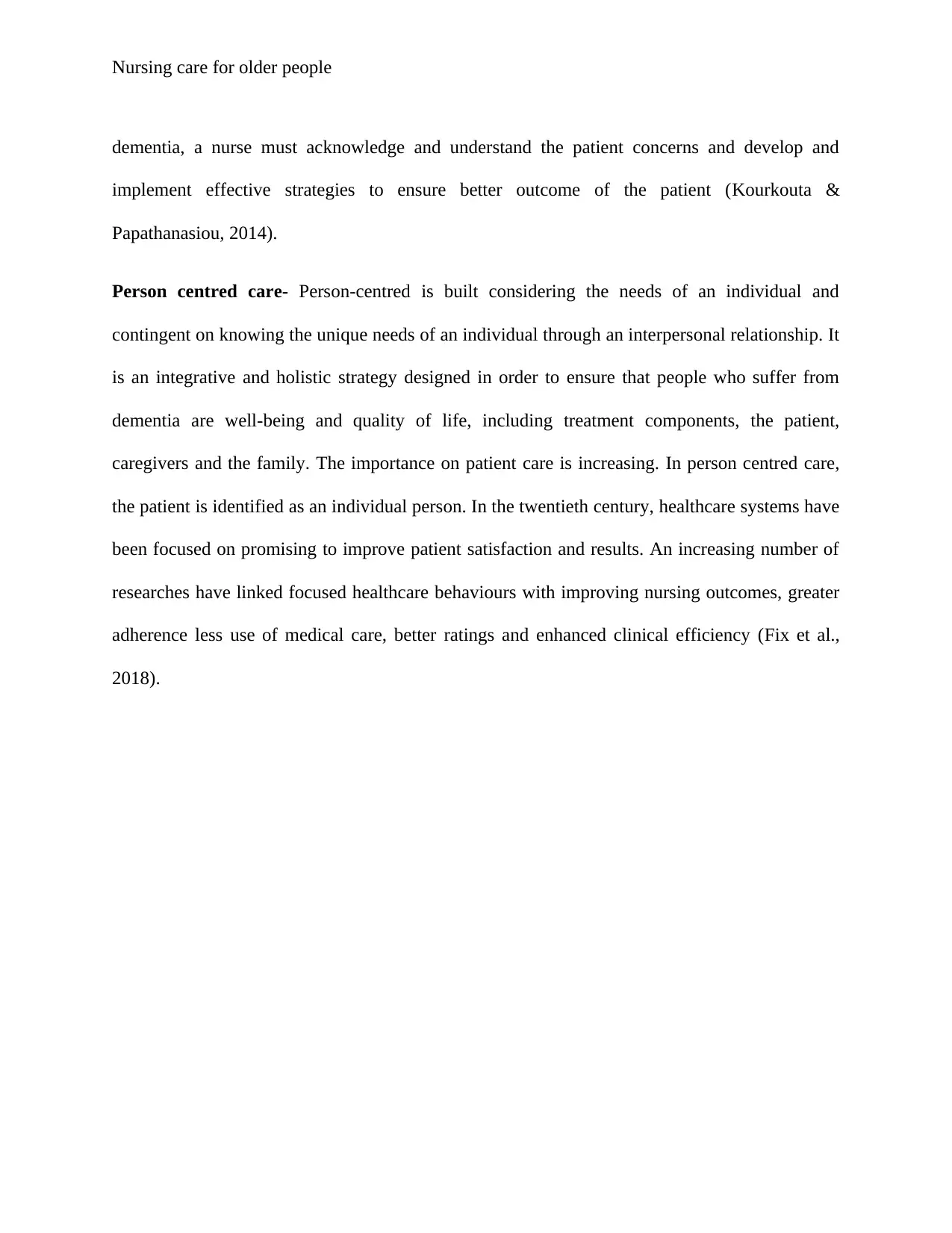
Nursing care for older people
dementia, a nurse must acknowledge and understand the patient concerns and develop and
implement effective strategies to ensure better outcome of the patient (Kourkouta &
Papathanasiou, 2014).
Person centred care- Person-centred is built considering the needs of an individual and
contingent on knowing the unique needs of an individual through an interpersonal relationship. It
is an integrative and holistic strategy designed in order to ensure that people who suffer from
dementia are well-being and quality of life, including treatment components, the patient,
caregivers and the family. The importance on patient care is increasing. In person centred care,
the patient is identified as an individual person. In the twentieth century, healthcare systems have
been focused on promising to improve patient satisfaction and results. An increasing number of
researches have linked focused healthcare behaviours with improving nursing outcomes, greater
adherence less use of medical care, better ratings and enhanced clinical efficiency (Fix et al.,
2018).
dementia, a nurse must acknowledge and understand the patient concerns and develop and
implement effective strategies to ensure better outcome of the patient (Kourkouta &
Papathanasiou, 2014).
Person centred care- Person-centred is built considering the needs of an individual and
contingent on knowing the unique needs of an individual through an interpersonal relationship. It
is an integrative and holistic strategy designed in order to ensure that people who suffer from
dementia are well-being and quality of life, including treatment components, the patient,
caregivers and the family. The importance on patient care is increasing. In person centred care,
the patient is identified as an individual person. In the twentieth century, healthcare systems have
been focused on promising to improve patient satisfaction and results. An increasing number of
researches have linked focused healthcare behaviours with improving nursing outcomes, greater
adherence less use of medical care, better ratings and enhanced clinical efficiency (Fix et al.,
2018).
Paraphrase This Document
Need a fresh take? Get an instant paraphrase of this document with our AI Paraphraser
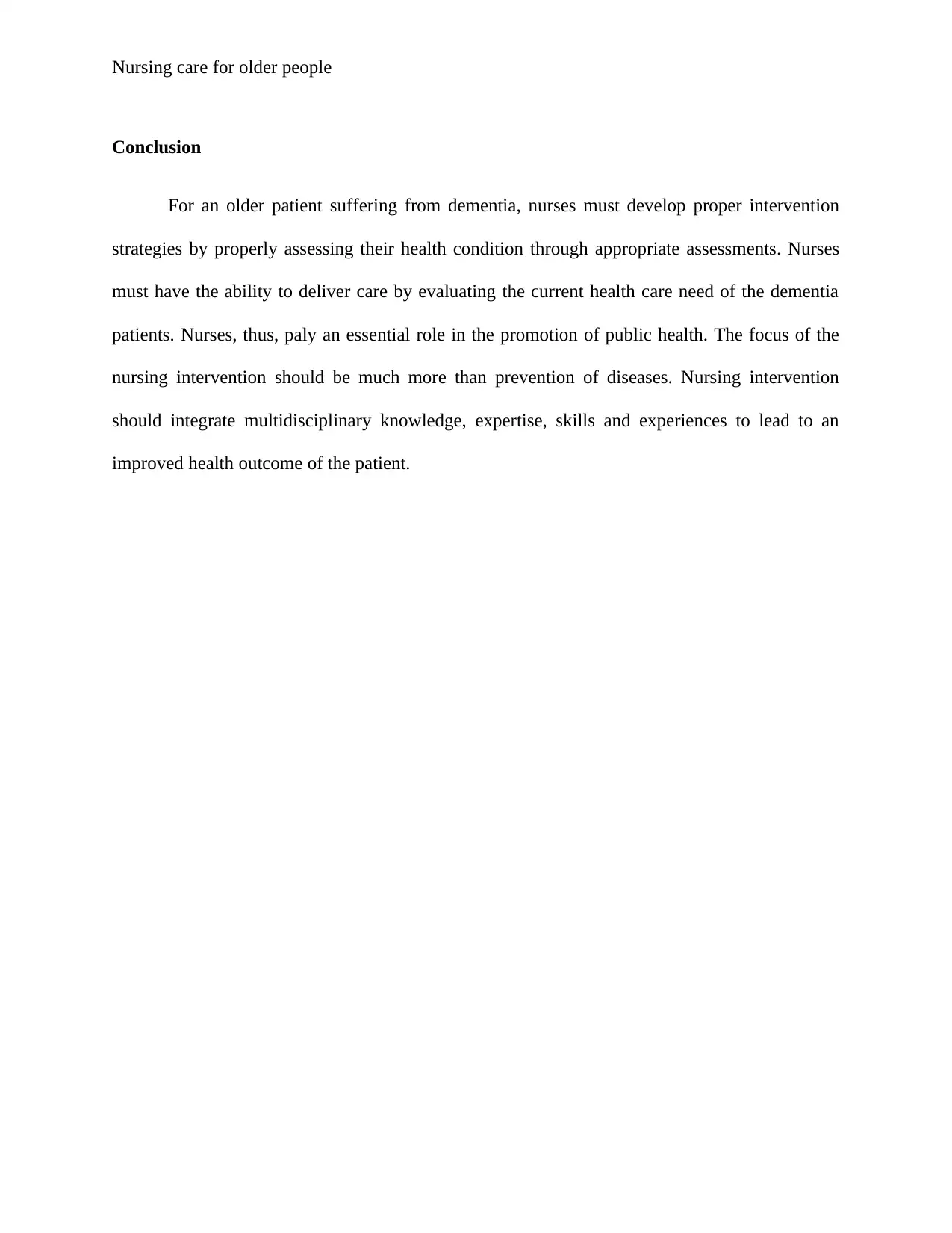
Nursing care for older people
Conclusion
For an older patient suffering from dementia, nurses must develop proper intervention
strategies by properly assessing their health condition through appropriate assessments. Nurses
must have the ability to deliver care by evaluating the current health care need of the dementia
patients. Nurses, thus, paly an essential role in the promotion of public health. The focus of the
nursing intervention should be much more than prevention of diseases. Nursing intervention
should integrate multidisciplinary knowledge, expertise, skills and experiences to lead to an
improved health outcome of the patient.
Conclusion
For an older patient suffering from dementia, nurses must develop proper intervention
strategies by properly assessing their health condition through appropriate assessments. Nurses
must have the ability to deliver care by evaluating the current health care need of the dementia
patients. Nurses, thus, paly an essential role in the promotion of public health. The focus of the
nursing intervention should be much more than prevention of diseases. Nursing intervention
should integrate multidisciplinary knowledge, expertise, skills and experiences to lead to an
improved health outcome of the patient.
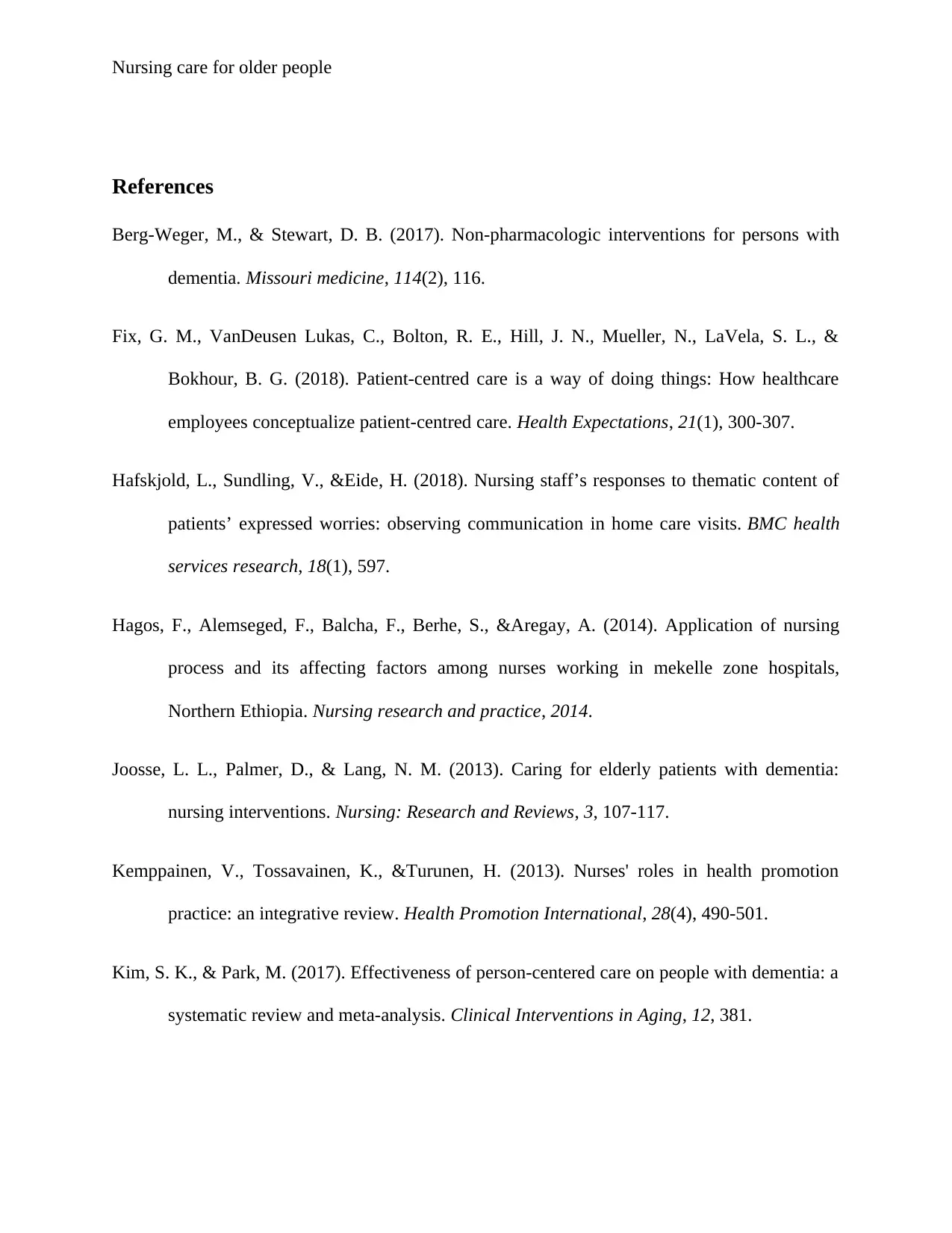
Nursing care for older people
References
Berg-Weger, M., & Stewart, D. B. (2017). Non-pharmacologic interventions for persons with
dementia. Missouri medicine, 114(2), 116.
Fix, G. M., VanDeusen Lukas, C., Bolton, R. E., Hill, J. N., Mueller, N., LaVela, S. L., &
Bokhour, B. G. (2018). Patient‐centred care is a way of doing things: How healthcare
employees conceptualize patient‐centred care. Health Expectations, 21(1), 300-307.
Hafskjold, L., Sundling, V., &Eide, H. (2018). Nursing staff’s responses to thematic content of
patients’ expressed worries: observing communication in home care visits. BMC health
services research, 18(1), 597.
Hagos, F., Alemseged, F., Balcha, F., Berhe, S., &Aregay, A. (2014). Application of nursing
process and its affecting factors among nurses working in mekelle zone hospitals,
Northern Ethiopia. Nursing research and practice, 2014.
Joosse, L. L., Palmer, D., & Lang, N. M. (2013). Caring for elderly patients with dementia:
nursing interventions. Nursing: Research and Reviews, 3, 107-117.
Kemppainen, V., Tossavainen, K., &Turunen, H. (2013). Nurses' roles in health promotion
practice: an integrative review. Health Promotion International, 28(4), 490-501.
Kim, S. K., & Park, M. (2017). Effectiveness of person-centered care on people with dementia: a
systematic review and meta-analysis. Clinical Interventions in Aging, 12, 381.
References
Berg-Weger, M., & Stewart, D. B. (2017). Non-pharmacologic interventions for persons with
dementia. Missouri medicine, 114(2), 116.
Fix, G. M., VanDeusen Lukas, C., Bolton, R. E., Hill, J. N., Mueller, N., LaVela, S. L., &
Bokhour, B. G. (2018). Patient‐centred care is a way of doing things: How healthcare
employees conceptualize patient‐centred care. Health Expectations, 21(1), 300-307.
Hafskjold, L., Sundling, V., &Eide, H. (2018). Nursing staff’s responses to thematic content of
patients’ expressed worries: observing communication in home care visits. BMC health
services research, 18(1), 597.
Hagos, F., Alemseged, F., Balcha, F., Berhe, S., &Aregay, A. (2014). Application of nursing
process and its affecting factors among nurses working in mekelle zone hospitals,
Northern Ethiopia. Nursing research and practice, 2014.
Joosse, L. L., Palmer, D., & Lang, N. M. (2013). Caring for elderly patients with dementia:
nursing interventions. Nursing: Research and Reviews, 3, 107-117.
Kemppainen, V., Tossavainen, K., &Turunen, H. (2013). Nurses' roles in health promotion
practice: an integrative review. Health Promotion International, 28(4), 490-501.
Kim, S. K., & Park, M. (2017). Effectiveness of person-centered care on people with dementia: a
systematic review and meta-analysis. Clinical Interventions in Aging, 12, 381.
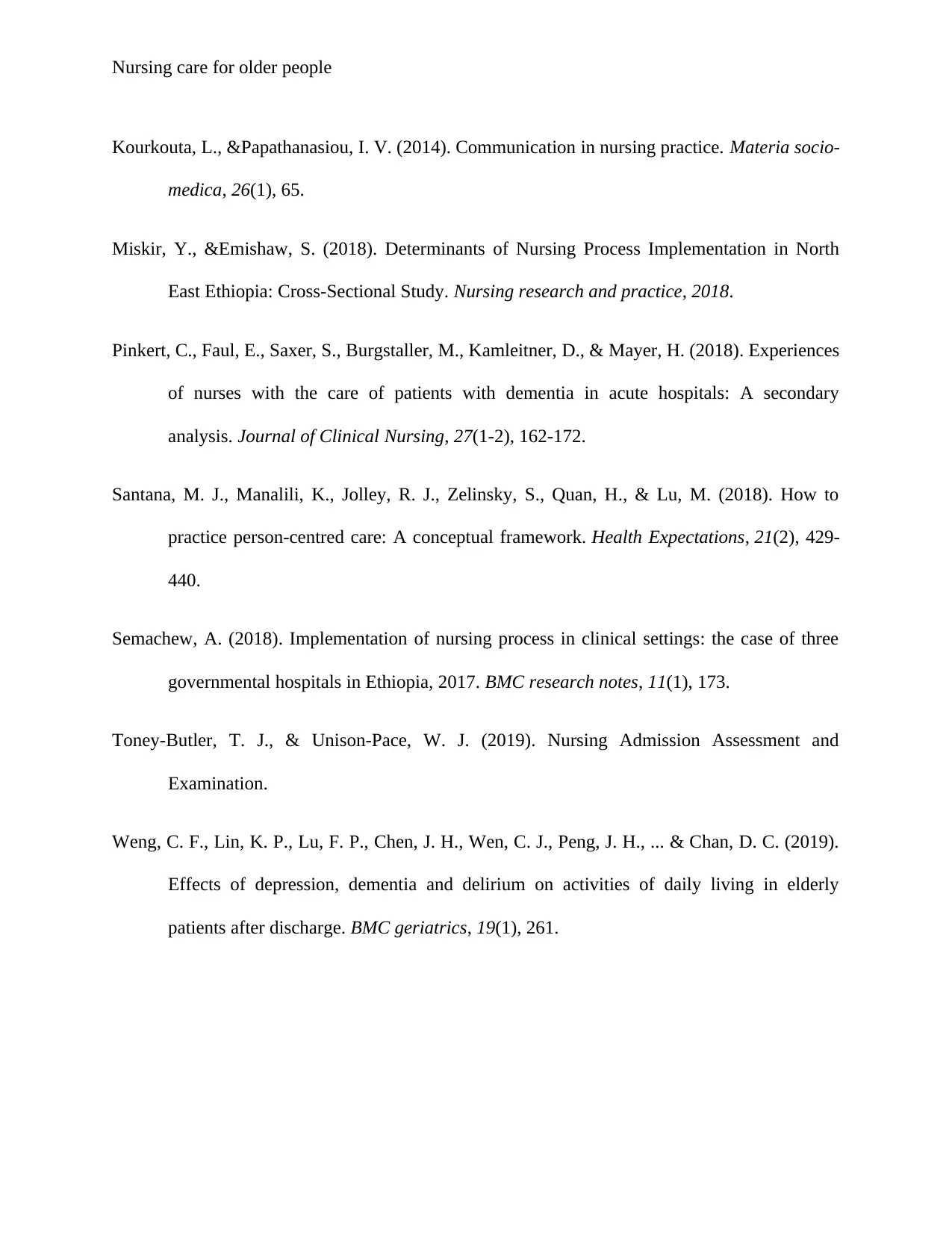
Nursing care for older people
Kourkouta, L., &Papathanasiou, I. V. (2014). Communication in nursing practice. Materia socio-
medica, 26(1), 65.
Miskir, Y., &Emishaw, S. (2018). Determinants of Nursing Process Implementation in North
East Ethiopia: Cross-Sectional Study. Nursing research and practice, 2018.
Pinkert, C., Faul, E., Saxer, S., Burgstaller, M., Kamleitner, D., & Mayer, H. (2018). Experiences
of nurses with the care of patients with dementia in acute hospitals: A secondary
analysis. Journal of Clinical Nursing, 27(1-2), 162-172.
Santana, M. J., Manalili, K., Jolley, R. J., Zelinsky, S., Quan, H., & Lu, M. (2018). How to
practice person‐centred care: A conceptual framework. Health Expectations, 21(2), 429-
440.
Semachew, A. (2018). Implementation of nursing process in clinical settings: the case of three
governmental hospitals in Ethiopia, 2017. BMC research notes, 11(1), 173.
Toney-Butler, T. J., & Unison-Pace, W. J. (2019). Nursing Admission Assessment and
Examination.
Weng, C. F., Lin, K. P., Lu, F. P., Chen, J. H., Wen, C. J., Peng, J. H., ... & Chan, D. C. (2019).
Effects of depression, dementia and delirium on activities of daily living in elderly
patients after discharge. BMC geriatrics, 19(1), 261.
Kourkouta, L., &Papathanasiou, I. V. (2014). Communication in nursing practice. Materia socio-
medica, 26(1), 65.
Miskir, Y., &Emishaw, S. (2018). Determinants of Nursing Process Implementation in North
East Ethiopia: Cross-Sectional Study. Nursing research and practice, 2018.
Pinkert, C., Faul, E., Saxer, S., Burgstaller, M., Kamleitner, D., & Mayer, H. (2018). Experiences
of nurses with the care of patients with dementia in acute hospitals: A secondary
analysis. Journal of Clinical Nursing, 27(1-2), 162-172.
Santana, M. J., Manalili, K., Jolley, R. J., Zelinsky, S., Quan, H., & Lu, M. (2018). How to
practice person‐centred care: A conceptual framework. Health Expectations, 21(2), 429-
440.
Semachew, A. (2018). Implementation of nursing process in clinical settings: the case of three
governmental hospitals in Ethiopia, 2017. BMC research notes, 11(1), 173.
Toney-Butler, T. J., & Unison-Pace, W. J. (2019). Nursing Admission Assessment and
Examination.
Weng, C. F., Lin, K. P., Lu, F. P., Chen, J. H., Wen, C. J., Peng, J. H., ... & Chan, D. C. (2019).
Effects of depression, dementia and delirium on activities of daily living in elderly
patients after discharge. BMC geriatrics, 19(1), 261.
1 out of 10
Related Documents
Your All-in-One AI-Powered Toolkit for Academic Success.
+13062052269
info@desklib.com
Available 24*7 on WhatsApp / Email
![[object Object]](/_next/static/media/star-bottom.7253800d.svg)
Unlock your academic potential
© 2024 | Zucol Services PVT LTD | All rights reserved.





